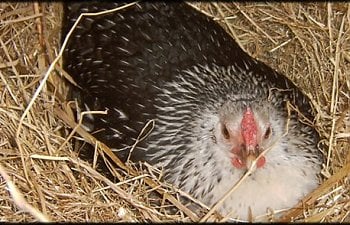Knowing when your hen is broody:
The first thing to do is to make sure that you have identified your hen as a broody correctly. Hens that are broody, or beginning to express broody behavior, you will notice, will stay in the nest box longer, and will puff up their feathers or growl when you come near, trying to peck at you if you touch them. Keep in mind the breed of hens you have, as some breeds are better at being broody then others, and will sport better incubating and mothering techniques with their chicks. Also remember, you should let the hen set on a pretend clutch of eggs for a couple of days, to a week, testing her to see if she is determined to hatch before you put eggs under her or let her set on her own clutch. Because, if she all of a sudden gives up, or leaves, you are left with partially developed eggs that will die in 6 hours if incubation fails to proceed.
Breaking Broodiness:
~ putting ice cubes under hen (takes a couple tries)
~ breaking eggs, leaving them in nest box for her to see
~ blocking her nest box (with a peace of wood etc.)
~ take her out of the nest all the time
~ put her on the roost with the other chickens at night
If you have an especially broody breed such as a Silkie, Cochin, Game breed, or pretty much any type of Bantam, you probably shouldn't have to worry if they will quit brooding during incubation, because these breeds have a notorious reputation for their spectacular brooding abilities. A broody hen will sit in the nest box all day, only coming out once each day to eat, drink, and defecate.If you ever have a hen from a breed that rarely broods, and she becomes broody, be very careful, she could either leave the nest during incubation or leave the chicks when they are still young. This has happened to me and many other people, so always have a backup brooder and incubator on cases like these.
The signs of a broody hen:
~puffing up feathers ~having large droppings
~pulling feathers out ~only coming out of nest box once a day
~growling ~makes distinct clucking sound when outside eating
~pecking/biting ~staying in the nest box
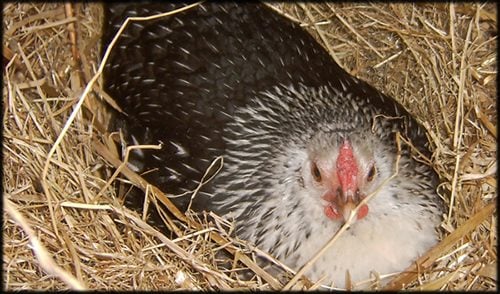
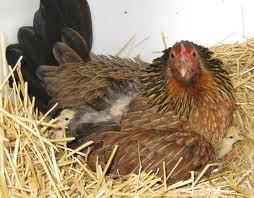
Broody Aggression:
All hens that become broody develop a type of aggression to protect their eggs and defend their chicks. How this happens, depends on the individual hen.Hens that were more skittish prior to being broody will now become more aggressive than hens that were friendly and became broody. The reason why, is because the ones that were more skittish, now see you more as a potential threat to their young and will peck you trying to defend themselves.This just makes them even better mothers, fiercely protecting their chicks against predators, but this will also make the chicks that much more afraid, and skittish of people. To help prevent this, it is helpful to spend time with the broody and her chicks each day, or whenever you can.Hens that are more friendly, and used to people, will be much friendlier broody hens, although they will all growl and raise their neck feathers when you come, they might not peck you as hard, and will not mind your presence when she is foraging with her chicks.
They will walk around looking like this And sitting like this
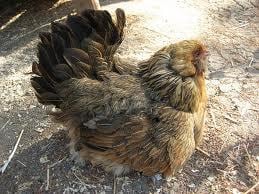
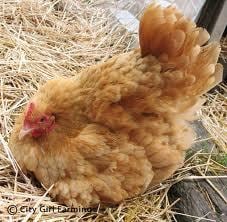
Incubation and hatching:
The hen will take care of most of the incubation. So you really don't have to worry too much. They pluck out some of their breast feathers, exposing their skin to the eggs, helping to heat the eggs better, regulating temperature, and controlling the humidity. They might kick out an egg or two from the nest box sometimes, this is because their instincts tell them that the egg is probably rotten or for some important reason, does not belong in the nest. Do not worry if your broody does some unusual things, it is usually for the good of the chicks. If you have one of the broodies from a breed that rarely broods, watch her closely, it is best to have a backup incubator in case anything happens or she "abandons nest". It is also good to have a backup incubator even with the especially broody type, because a predator or dog might eat them during their passing hour of eating and drinking, although rare, this has happened, and with having a backup 'bator, you can save the hatch.
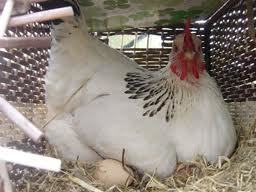
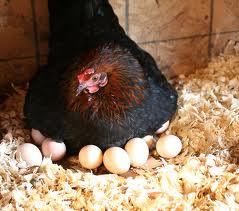
During the incubation period, the hens feeder should be a chick feeder filled with baby chick mash, and she should have a baby chick waterer also. This is to get her used to the idea, that there is where she eats, and that is her food. So when the chicks hatch, she is able to show the chicks where, and how, to eat & drink.
Many people ask if you should take the hen off the nest during lockdown. Usually, a hen will get up off her nest each day to eat, drink, and eliminate.But the last three days of incubation, she might be more inclined to stay on the nest full time.It is not necessary for her to get up and eat on the day of hatch. She should set on the hatching eggs and not get up at all. But the few days before hatch day, it is advised she get up to eat and drink. I, personally wouldn't let the hen out for long periods of time during the lockdown period, because it could chill the eggs and possibly kill them, but she will know better to get off anyways, so now you worry that she needs to be fed. I always set a little bowl of food and water right in front of the nest box, so all she really needs to do is stretch her neck a little bit to gain access to it,and not messing up her hatch. This method is especially helpful in colder climates, where the eggs could chill shortly after the hen gets off the nest.
Once the chicks start hatching, the hen knows by instinct to stay put and not leave the nest until most, or all the chicks, have hatched. If she decides to leave the nest with the already hatched chicks, and you see that there is still an egg or two that are hatching, or alive, take them into your house and set the eggs on a towel under a warm lamp.Once those eggs hatch, keep them inside and return them to the hen later on that night. If you think the hens stays too long on the nest once all the chicks have hatched, and there is only one egg left that you think is a dud, leave them alone. Do not fear for the hunger of the chicks.Newly hatched chicks still have yolk reserves from the egg, and don't have to eat for the first 24 to 48 hours. They evolved this way, because they have have to wait a day or two under the hen, before all the eggs hatch and the hen decides it's time to go outside.
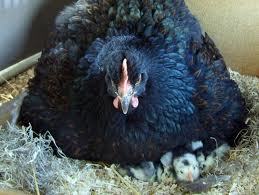
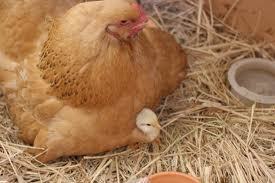
Raising the chicks:
Once the hen believes that enough chicks have hatched, she will take the chicks and head out of the nest box. She will teach them how to eat and drink. She will sit on them at night and keep them warm. She will pretty much show them everything there is for a chicken to learn and will protect them along the way. The hen and her chicks should be separate from the main flock for at least a week.
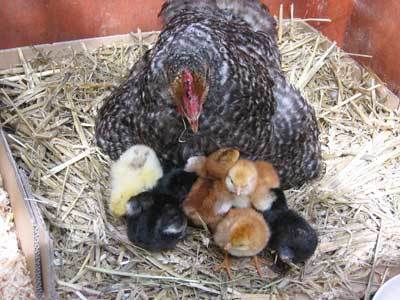
It is preferred to have them separate from the flock, then put them in once the chicks are 2 months old. But If you so desire to have them with the main flock, there are some requirements that should be attended to. Make sure that the hen and her chicks, have their own nest box, that is on the floor, in a private corner of the coop. The chick feeders and waterers must be near the nest box, as they will spend much of their time there, for their first weeks of life. Also make sure to have chick grit, because if their going to be out free ranging with the big girls, they need to be able to eat grass and such and be able to digest it properly. If you have them separate from the flock, with their mother, in a little coop and they only eat chick mash, chick grit is not necessary. Chicks tend to get lost very easily, and can get stuck in the weirdest places. You need to count the chicks every night when they are in the nest box, and look for ones that are missing. It is also advised to have marbles or rocks in the water, as they tend to like drowning themselves. This is because they were used to swimming as a little embryo inside the egg, and once they hatch, they have a desire to jump into water, thinking they are still that little embryo. The desire to drown themselves fades away with age and they won't be doing it once they are 1 week old. But precautions still need to be taken care of.
Raising the chicks with the rest of the flock is fairly dangerous, especially if there are roosters around. That is why it is preferred to have the mother and chicks in their own little separate coop. This will make it easier to keep track of chicks, so they don't get lost. It will also eliminate the possibility of other chickens attacking them. Their feeders and waterers should still be fairly near to the nest box, and waterers should still have marbles or rocks inside of them. Spending time with the chicks whenever you can, will help them to get used to people, and be more friendly. The chicks and the mother hen, should be mixed in with the flock once they are 2 months old. The mother hen will help her chicks find their place in the pecking order and will soon loose her broodiness, and the chicks will now be old enough to fend for themselves.


